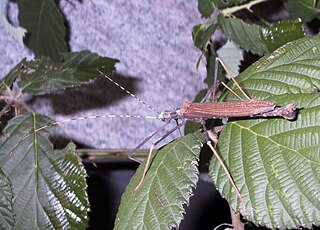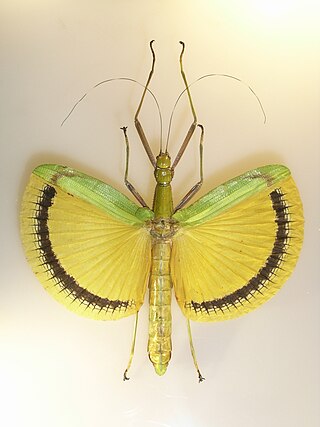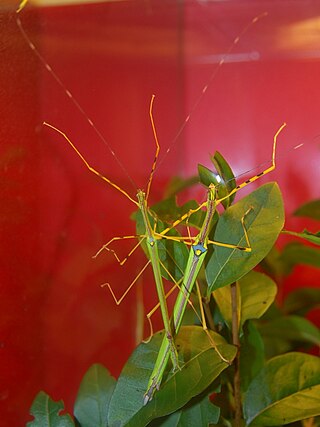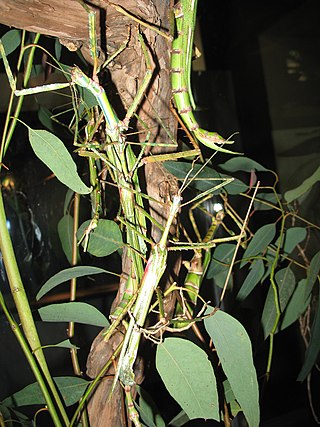
Conocephalus is a genus of bush crickets, known as coneheads. It was described by Carl Peter Thunberg in 1815.

Euconocephalus is a genus of bush cricket in the 'conehead' tribe Copiphorini.

Phobaeticus is a genus of Asian stick insects comprising over 25 species. The genus includes some of the world's longest insects.

Pseudophasmatidae is a family of stick insect, in the suborder Verophasmatodea, commonly called the "striped walkingsticks". An important identifying characteristic is its mesothorax, which is never more than three times as long as the prothorax.

Necrosciinae is a subfamily of the stick insect family Lonchodidae, with its greatest diversity in South-East Asia.
Pterinoxylus spinulosus is a species of stick insect found in the Neotropics. It was first described by the Austrian entomologist Ludwig Redtenbacher in 1908, from an adult male and an immature female. It was not until 1957 that an adult female was described by J.A.G. Rehn.

Sipyloidea is a genus of stick insects of the family Lonchodidae. Species have been recorded from India, China, Indochina, through to Australasia. The genus was described by Brunner von Wattenwyl in 1893.

Ruspolia is a genus of bush crickets in the subfamily Conocephalinae. This genus includes species that may be called 'cone-heads', but the name has also been used for Conocephalus and other genera in the subfamily.

Marmessoidea is an Asian genus of stick insects in the family Lonchodidae and subfamily Necrosciinae. The native range of species appears to be from India and South-East Asia to the Wallace line.

Necroscia is an Asian genus of stick insects in the family Lonchodidae and tribe Necrosciini. Species have been recorded from South-East Asia.

Calvisia is a genus of stick insects in the subfamily Necrosciinae. Species are known to be distributed in temperate and tropical Asia.

Achrioptera is a genus of stick insects first described in 1861. It is one of two genera in the tribe Achriopterini, the other being Glawiana. Species in the genus Achrioptera occur in Africa, including Madagascar. Although they are brightly colored, members of Achrioptera are able to effectively mimic thorny twigs and sticks for camouflage.

Eurycnema is a genus of stick insects in the family Phasmatidae and tribe Phasmatini. Species have a known distribution from Australia, New Guinea, Kei islands, Timor, Wetar & Solor.

Paramenexenus is a genus of Asian stick insects belonging to the family Lonchodidae, erected by Josef Redtenbacher in 1908.
Parasosibia is a genus of phasmids belonging to the family Lonchodidae.

The Cladomorphinae are a subfamily of stick insects in the family Phasmatidae. This taxon is particularly well represented in the Neotropical region, but records also exist for Madagascar, Java and the Maluku Islands.
Singaporoidea is an Asian genus of stick insects in the family Lonchodidae and subfamily Necrosciinae.

Lamachodes is a genus of stick insects in the tribe Necrosciini, erected by Josef Redtenbacher in 1908. To date (2022) species have been recorded only from Vietnam.
Scionecra is a genus of Asian stick insects in the tribe Necrosciini, erected by Heinrich Hugo Karny in 1923. Species have been recorded from: China, Vietnam, Malesia through to Australia.
Pachyscia is a genus of Asian stick insects in the tribe Necrosciini, erected by Josef Redtenbacher in 1908. Species have been recorded from Vietnam and China.














